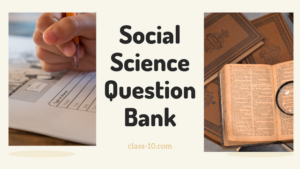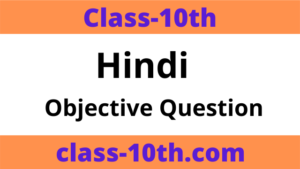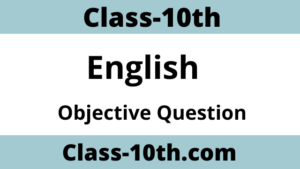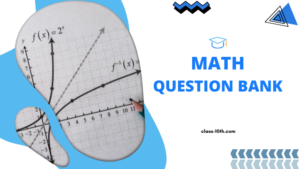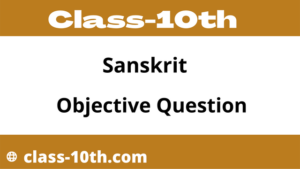Class 10th English Reader Objective Question Chapter 2 (vvi Objective) (अंग्रेज़ी) बिहार बोर्ड कक्षा 10 अंग्रेज़ी अध्याय 2 (Allergy) (ऐलर्जी) का अब्जेक्टिव प्रश्न पीडीएफ़ Bihar Board (Matric मैट्रिक) vvi Objective in Hindi pdf
Allergy
1. Substances causing a violent reaction to the human immune system are called
(A) Allergy
(B) Allergents
(C) Allergens
(D) None of these
Ans.(A)
2. Sheets, mattress pads and blankets should be washed ……… in hot water.
(A) Yearly
(B) Daily
(C) Weekly
(D) Monthly
3. A person has to be exposed to the particular……….. for some time to become allergic to it. [2018A]
(A) Symptom
(B) Antigen
(C) Allergen
(D) Protein
Ans.(C)
4. IgE was discovered in
(A) 1837
(B) 1867
(C) 1957
(D) 1967
Ans.-(D)
5. Initially, allergy often appears as seemingly……… condition, such as hay fever during the pollen season.
(A) Begin
(B) Benigh
(C) Binign
(D) Benin
Ans.(B)
6. The two scientists-Uppsala and Baltimore discovered immunoglobulin E or IgE antibodies in
(A) 1866
(B) 1867
(C) 1986
(D) 1967
Ans.-(D)
7. How many general approaches are there to the treatment of allergic diseases ?
(A) 2
(B) 3
(D) 5
Ans. (B)
8. Our basic understanding of allergy has evolved from the discovery in……….
(A) 1960
(B) 1965
(C) 1966
(D) 1967
Ans.(D)
9. For effective asthama treatment, it is important for a person to consider some other things too besides the obvious signs
of the disease.
(A) True
(B) False
(C) Both
(D) None
Ans. (A)
10. What is IgE ?
(A) Allergy
(B) Antibody
(C) Allergen
(D) None of these
Ans.(B)
11. A powder produced by the male part of a flower
(A) Allergy
(B) Poll
(C) Pollen
(D) Allergen
Ans.(C)
12. Allergens are of……..
(A) Two types
(B) Three types
(C) Four types
(D) Many types
Ans.(A)
13. Often at first, allergy appears in a …….. form.
(A) Allergen
(B) Dew
(C) Mild
(D) None of these
Ans.(C)
14. Who is the author of “Allergy”?
(A) Premchand
(B) Dr. Rana S. P. Singh
(C) Puran Singh
(D) None of these
Ans.-(B)
15. EcP is a
(A) Allergy
(B) Milk
(C) Protein
(D) Allergen
Ans. (C)
16. Dr. Rana S.P. Singh was born on
(A) 23 January 1976
(B) 28 January 1976
(C) 23 March 1879
(D) 18 January 1896
Ans.(A)
17. Genetic and environment risk factors can cause
(A) Immune
(B) Mild
(C) Allergies
(D) Antibody
Ans.- (C)
18. Which of the following is caused by Allergy ?
(A) Fever
(B) Eczema
(C) Asthma
(D) All of the above
Ans. (D)
19. The most troublesome allergen in North America is
(A) Allergies
(B) Ragweed
(C) Ragweed pollen
(D) Itching and paining
Ans.(C)
20. The clinical use of inhaled ………… is currently gaining ground due to their anti-inflammatory effects.
(A) Steroids
(B) Proteins
(C) Allergens
(D) Antibodies
Ans.–(A)
21. IgE antibodies is that they can be specific for hundreds of different……….
(A) Allergy
(B) Allergens
(C) Antibodies
(D) Diseased
Ans.- (B)
22. The….. path of allergy development is widely referred to as “the allergy march.”
(A) Side
(B) Twisted
(C) Direct
(D) Indirect
Ans. (C)
23. What is allergy ?
(A) A malfunction of human immune system
(B) A Genetic disease
(C) A disease caused by Pollution
(D) None of these
Ans.(A)
24. What is the full form of ECP ?
(A) Economic Cationic Protein
(B) Elementary Cationic Protein
(C) Eosinophilic Cationic Protein
(D) Effective Current Phosphate
Ans.(C)
25. What is suggested to avoid allergy ?
(A) Wear of pollen mask when moving the Grass
(B) Stay indoors in the morning and on windy days
(C) Read and understand food labels
(D) All of the above
Ans. (D)
26. What are allergens ?
(A) Allergic remedy
(B) Harmful
(C) Substances producing allergic reaction
(D) Harmless substances
Ans.(C)
27. How can be Allergic diseases treated ?
(A) By avoidance of the allergen
(B) By taking anti-allergic medicine
(C) By taking anti-allergic doses
(D) Both (A) & (B)
Ans. (D)
28. Our basic understanding of allergy has evolved from the discovery by scientistis……..
(A) Uppola and Baltimore
(B) Uppsala and Boltimore
(C) Uppsala and Baltimore
(D) None of these
Ans. (C)
29. Which one of the following is a suggestion to avoid allergen?
(A) Allow dander-producing animals in the house
(B) Read and understand food labels
(C) Don’t enclose mattress, box springs and pillows in plastic barrier cloth
(D) None of these
Ans.–(B)
30. Which one of the following is not suggested to avoid allergen?
(A) Remove carpets and upholstered furniture.
(B) Rid the home of indoor plants and other sources of mildew.
(C) Don’t stay indoors in the morning and on windy days.
(D) Keep windows and doors closed during heavy pollination seasons.
Ans.(C)
